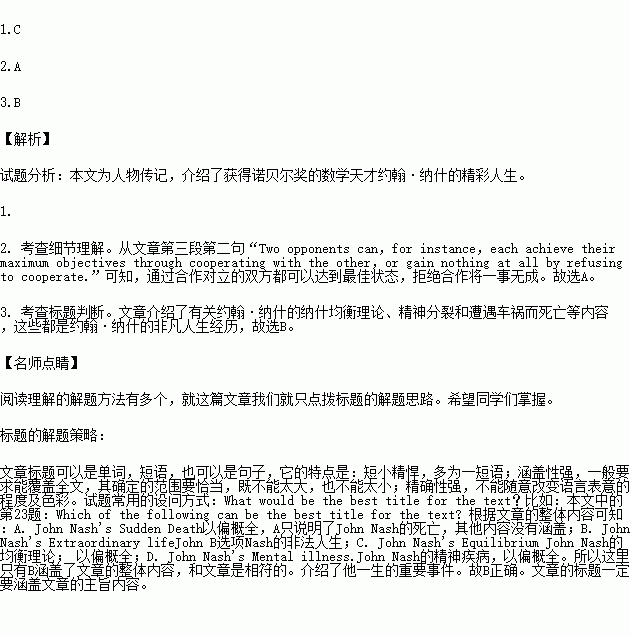题目内容
阅读下列短文,从每题所给的A、B、C和D项中,选出最佳选项,并在答题卡上将该项涂黑。
John Nash,a Nobel Prize winner and a mathematical genius whose struggle with mental illness was documented in the Oscar-winning film A Beautiful Mind,was killed in a car accident on May 24th, 2015.
Born in West Virginia, Nash displayed a keenness for mathematics early in life,independently proving Femret's little theorem(定理)before graduating from high school. By the time he turned 30 in 1958,he was an unquestionable academic celebrity. At Princeton, Nash published a 27-page thesis that led to applications to economics,international politics, and evolutionary biology
His signature solution-known as a "Nash Equilibrium(纳什均衡)”-found that competition among two opponents,not necessarily governed by zero-sum logic. Two opponents can, for instance,each achieve their maximum objectives through cooperating with the other, or gain nothing at all by refusing to cooperate. It is now regarded as one of the most important social science ideas in the 20th century.
In the late 1950s, Nash began a slide into mental illness. By the time Nash was awarded the Nobel Prize in Economics in 1994, he hadn't published a paper in 36 years. But like a child cured of a nightmare by the switch of a light, Nash recovered from his illness seemingly by choosing not to be sick anymore. He continued to work, travel,and speak at conferences for the rest of his life.
In 2001,the release of the film A Beautiful Mind,based an Sylvia Nasar’s 1998 book of the same name,introduced Nash's unusual life story to an international audience
1.John Nash passed away because of__________
A. a mental illness B. overwork
C. a traffic accident D. starvation
2.According to“Nash Equilibrium",what will happen if two opponents refuse to cooperate?
A. They will get nothing at all.
B.They will get what they really want
C. 'They will lose the support from each other
D. They will achieve their maximum objectives.
3.Which of the following can be the best title for the text?
A. John Nash's Sudden Death
B. John Nash's Extraordinary life
C. John Nash's Equilibrium
D. John Nash's Mental illness.
 天天向上一本好卷系列答案
天天向上一本好卷系列答案 小学生10分钟应用题系列答案
小学生10分钟应用题系列答案

 ),并在其下面写出该加的词。
),并在其下面写出该加的词。